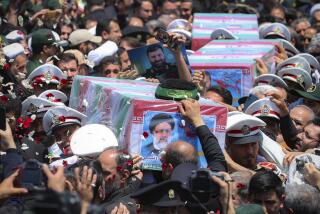The terrible price of fear
- Share via
THE PILGRIMAGE HONORING Imam Musa al Kadhim isn’t supposed to be a joyous occasion. The imam is said to have been poisoned by the caliph in 799, his body dumped off a bridge over the Tigris River in Baghdad. On Wednesday, a bridge near that spot became a scene of unimaginable horror, turning a day of historic and religious mourning into one of very present, very personal grief.
Iraqi President Jalal Talabani blamed Abu Musab Zarqawi, Iraq’s Al Qaeda terrorist leader, for the stampede that killed at least 845 Shiites headed across the bridge to the Kadhimiya shrine to commemorate the imam’s martyrdom. The interior minister, Bayan Jabr, blamed it on a Sunni insurgent, who he said spread a rumor that there was a suicide bomber within the crowd packed on the bridge. A spokesman for Iran’s foreign ministry blamed outside forces, seemingly implying the United States, saying “suspicious hands” were trying to foment tension and bloodshed among Iraq’s ethnic groups.
The identity of the person or group responsible for sparking the stampede may never be known. But even if it all started innocently, blame for the deaths lies squarely at the feet of Iraq’s terrorist insurgents.
Terrorism is the use of violence to spread fear in hopes of political gain. Wednesday’s events showed that fear can be as deadly as suicide bombs or improvised explosive devices.
The stampede happened because a rumor set off a panic; that rumor was all the more credible because the Kadhimiya pilgrims had been attacked with rockets and mortars before the incident on the bridge.
Iraq’s newfound religious freedom comes with strings attached. Ironically, this kind of incident would have been unlikely under the dictatorship of Saddam Hussein because he squelched Shiite religious observances. Religious leaders may want to discourage such mass gatherings until Iraq’s security situation is under better control. Of course, that day seems to recede further into the future with every new atrocity by insurgents and every failed attempt at compromise by Iraqi legislators.
Sunni leaders continue to condemn the nation’s draft constitution, which will go before the voters in an Oct. 15 referendum. Even if it is approved, the document leaves many of the most contentious issues to be decided by next year’s National Assembly. Conditions in Iraq won’t improve until Sunnis and Shiites show more willingness to bend than they have so far.
More to Read
Sign up for Essential California
The most important California stories and recommendations in your inbox every morning.
You may occasionally receive promotional content from the Los Angeles Times.













